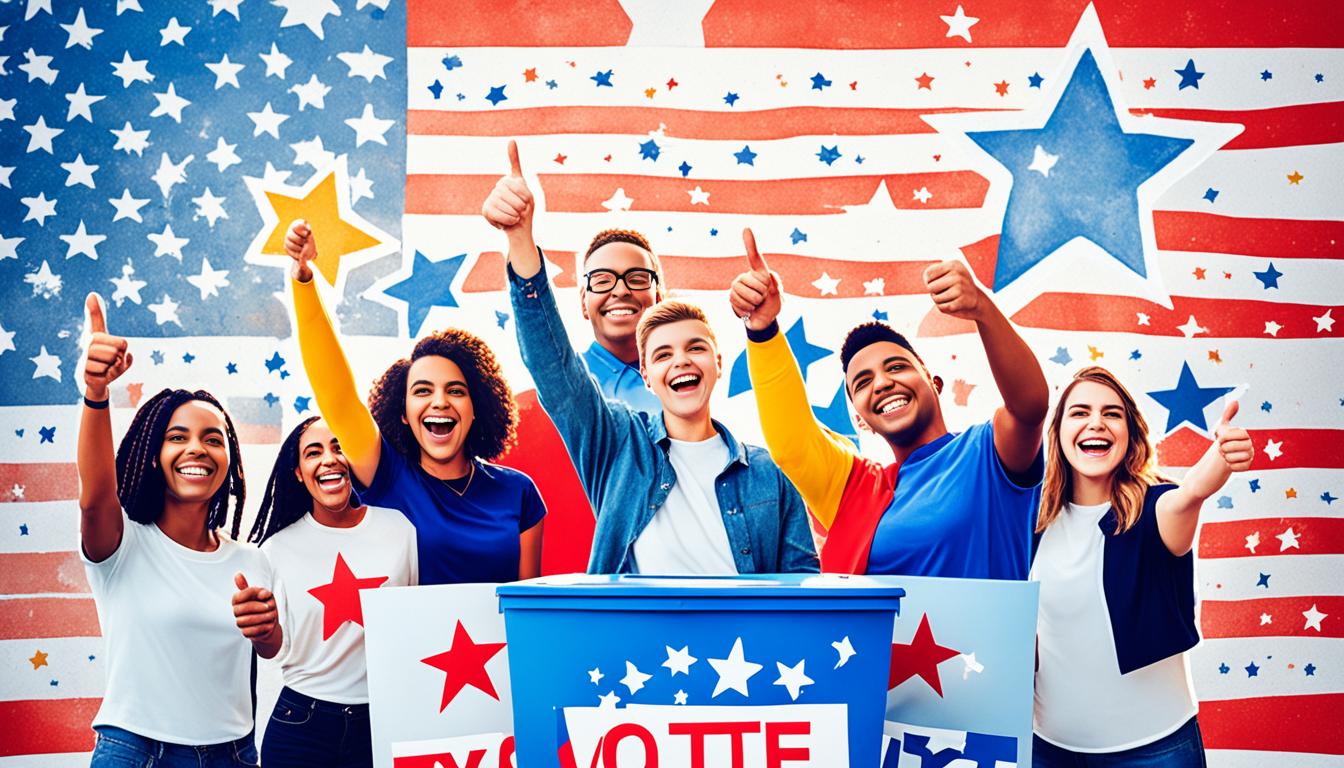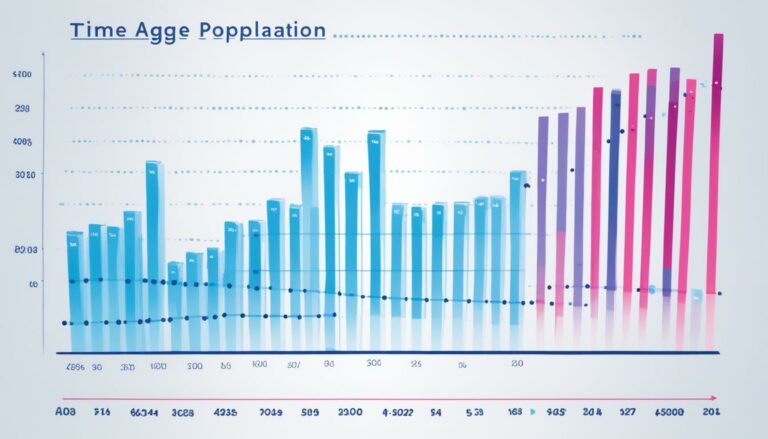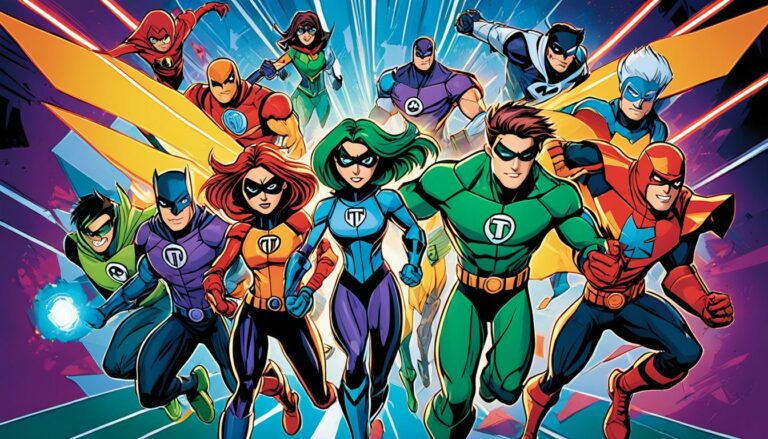Should Teens Be Allowed to Vote? Pros & Cons
The debate surrounding whether or not teens should be allowed to vote is a topic of much discussion. Proponents argue that lowering the voting age can encourage youth political engagement and ensure that young voices are heard in the democratic process. On the other hand, critics believe that teens may be too immature or lack the necessary knowledge and experience to make informed decisions. Let’s explore the pros and cons of allowing teens to vote.
Key Takeaways:
- Lowering the voting age can foster youth political engagement and civic participation.
- Teens should have a say in electing officials who make decisions that directly impact their lives.
- Allowing teens to vote can lead to increased representation and diverse perspectives in the political landscape.
- Engaging in the electoral process at a young age can help teens develop critical thinking skills and become better informed about political issues.
- Critics express concerns about teens’ maturity and readiness to make important decisions.
The Case for Allowing Teens to Vote
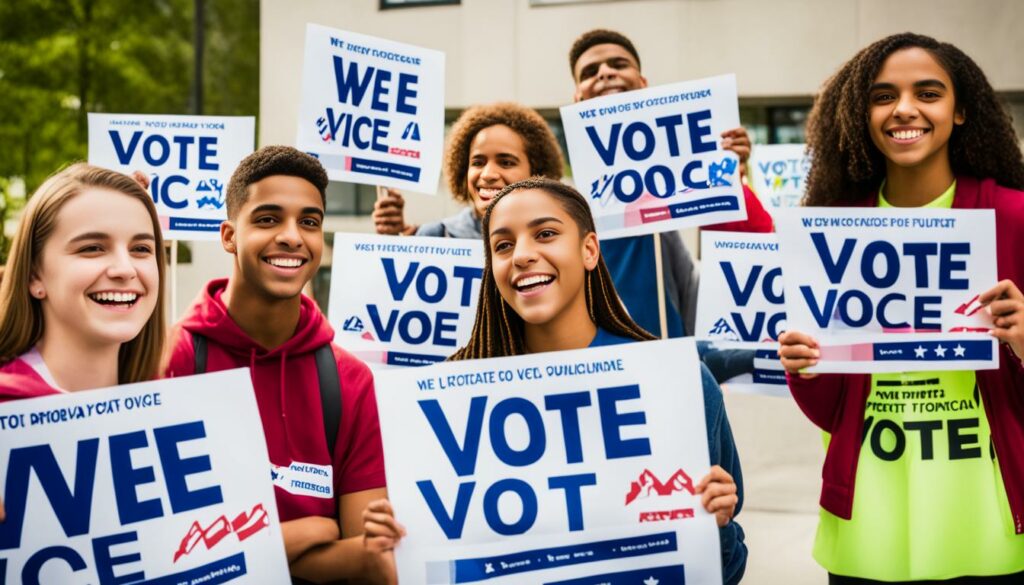
Supporters of lowering the voting age argue that it can foster youth political engagement and civic participation for teens. They believe that involving young people in the democratic process early on can instill a sense of civic duty and encourage them to be active participants in society. Additionally, proponents of teen voting rights state that if 16-year-olds are allowed to work, pay taxes, and drive, they should also have a say in electing the officials who make decisions that directly impact their lives.
“Youth should have the right to express their opinions and contribute to the political discourse. Lowering the voting age is the next step in ensuring that young people are not only seen, but also heard in our society.”
The Benefits of Youth Political Engagement
Allowing teens to vote can have a profound impact on both individuals and society. By actively participating in elections, young people can develop a sense of political efficacy and realize the power they possess to shape their communities. This early exposure to democratic processes can lead to a lifelong commitment to civic engagement and a deeper understanding of the rights and responsibilities of being an informed citizen.
Moreover, civic education programs that accompany the voting process can cultivate critical thinking skills and encourage young people to explore different perspectives. Engaging in debates and discussions about political issues can broaden their understanding of complex topics and help them make more informed choices. By including teens in the electoral process, we can nurture a future generation of informed and engaged citizens.
Addressing Concerns
Opponents of lowering the voting age often raise concerns about the maturity and readiness of teens to make informed decisions. However, it is essential to differentiate between chronological age and individual maturity. Many teens possess the intellectual capacity and knowledge to make informed choices, especially when provided with the necessary resources and educational opportunities.
Furthermore, it is worth noting that voting is not a decision made in isolation. Young voters have access to a wealth of information through various sources, including the internet, social media, and educational institutions. They can seek advice from trusted adults and engage in discussions with their peers. By actively participating in the political process, teens can develop the skills and judgment necessary to make well-informed decisions.
Voting Age Comparison
| Country | Voting Age |
|---|---|
| Austria | 16 |
| Scotland | 16 |
| Argentina | 16 |
| Estonia | 16 |
Several countries, including Austria, Scotland, Argentina, and Estonia, have already recognized the importance of youth political engagement by lowering the voting age to 16. These countries’ experiences provide valuable insights into the potential benefits and challenges of extending voting rights to teens. Studies conducted in these nations have shown that young voters are capable of making informed choices and actively participating in the democratic process.
Increased Representation and Diverse Perspectives
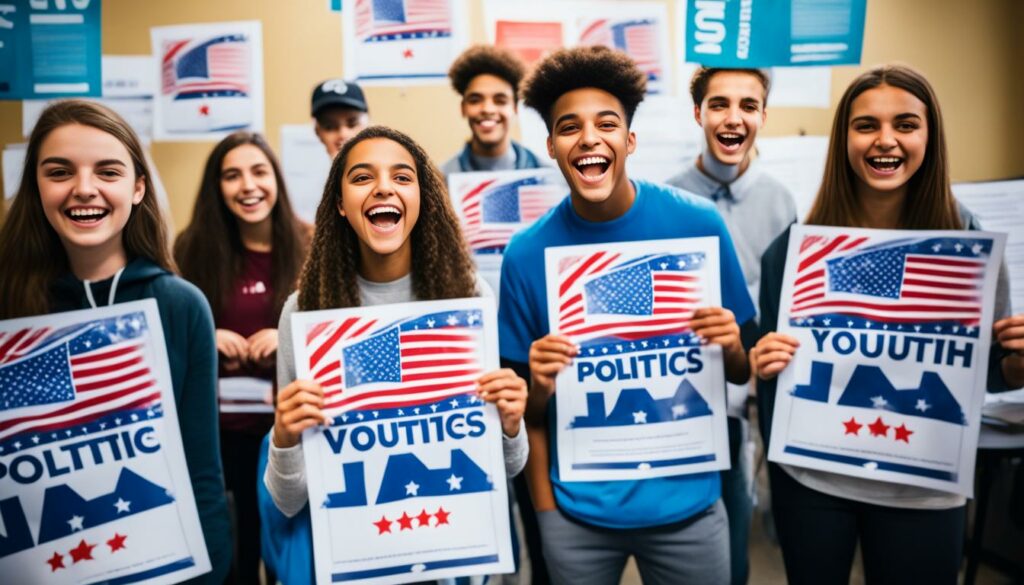
Allowing teens to vote can lead to increased representation and a diversity of perspectives in the political landscape. Teens have unique concerns and viewpoints that may differ from those of older voters. Lowering the voting age can ensure that these perspectives are taken into account and that the government is more representative of the entire population.
When teens are granted the right to vote, it opens the door for their voices to be heard in the decision-making process. They bring fresh ideas, energy, and a different lens through which they view the world. By including teens in the electoral process, we can ensure that policies and legislation address the issues that directly impact them and future generations.
With the inclusion of teenagers in the voting pool, we can expect a more diverse range of ideas and perspectives. This diversity is crucial for a healthy democracy as it helps prevent groupthink and encourages critical examination of policies from multiple angles. By embracing the unique perspectives of teenagers, we can foster innovation, inclusivity, and progress in our political system.
“Teenagers have a unique ability to see beyond the status quo, challenge the norms, and push for change. By giving them the right to vote, we allow them to exercise their agency and actively participate in shaping the future of our society.”
Moreover, when we lower the voting age, we enable young people to engage in the political process earlier in life. This early exposure to civic duty and decision-making can lead to a lifelong commitment to active citizenship. By helping them understand their rights, responsibilities, and the power of their vote, we equip teenagers with the tools to become informed and engaged citizens.
The Power of Teen Voter Participation
Teen voter participation holds great potential for positive change in our society. It can lead to innovative policy solutions that address the needs of younger generations. By allowing teenagers to vote, we empower them to take ownership of their future and stand up for issues that matter to them.
To illustrate the impact of teen voter participation, consider the following data on recent elections:
| Election | Voter Turnout (18+) | Voter Turnout (16-17) |
|---|---|---|
| 2016 Presidential Election | 55.7% | NA |
| 2020 Presidential Election | 66.8% | 41.9% |
| 2022 Midterm Election | 50.1% | 37.5% |
This data highlights the potential for increased voter turnout when 16 and 17-year-olds are given the opportunity to vote. By engaging young people early on and encouraging their participation, we can create a more vibrant and inclusive democracy.
Potential for Political Education and Awareness
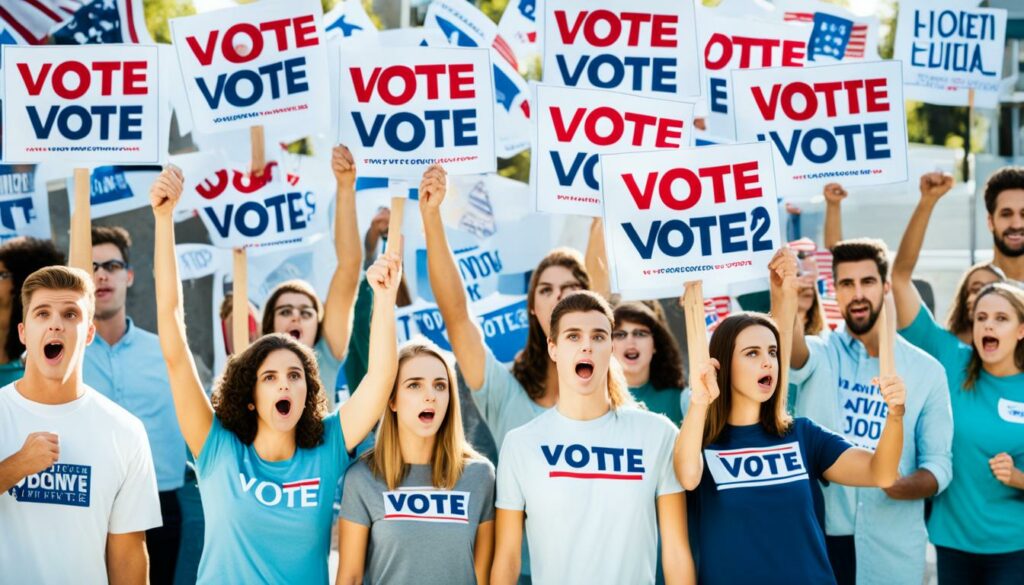
Lowering the voting age can provide an opportunity for political education and raise awareness among young people. Engaging in the electoral process at a younger age can help teens develop critical thinking skills, become better informed about political issues, and learn to make their own decisions. This early exposure to politics can encourage lifelong civic engagement and active participation in democracy.
By allowing teens to vote, we empower them with the knowledge and experience necessary to navigate the complex political landscape. It provides an avenue for them to learn about the candidates, understand different ideologies, and evaluate policies that shape our society.
One way in which lowering the voting age can contribute to political education is by promoting discussions and debates among young people. When teens have the opportunity to participate in elections, they are more likely to engage in conversations with their peers, teachers, and family members regarding political issues. These discussions foster critical thinking and help them form their own opinions.
Furthermore, lowering the voting age can encourage educational institutions to prioritize civic education. Schools may develop curriculum and programs that focus on teaching students about the electoral process, government structures, and the importance of civic engagement. This would lay a foundation for active citizenship and civic responsibility.
Overall, expanding the voting rights of teenagers promotes not only their political education but also their ability to become active participants in shaping the future of their communities and the nation.
Challenges and Concerns
Critics of allowing teens to vote have expressed concerns about their maturity and readiness to make important decisions. Some argue that teens may be easily influenced or swayed by peer pressure, leading to uninformed voting choices. Others raise concerns about the lack of life experience and limited knowledge of the political system that teens may have. Additionally, opponents worry that lowering the voting age could dilute the impact of older, more experienced voters.
| Challenges | Concerns |
|---|---|
|
|
However, it is essential to consider that not all teens are easily swayed or lack knowledge of the political system. Many young individuals are highly informed, politically engaged, and capable of making important decisions.
International Perspectives
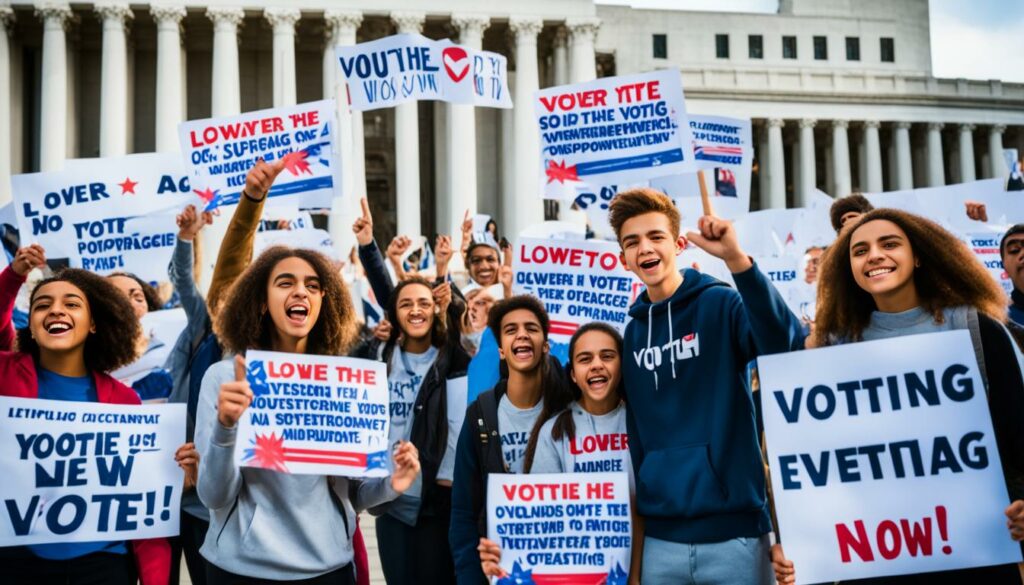
When it comes to the debate on teen voting rights and lowering the voting age, several countries have already implemented these policies, providing valuable insights into the impact of youth voting. One such example is Austria, where 16-year-olds are allowed to vote in all elections.
Studies analyzing the effects of youth voting in Austria have found that while the voter turnout among 16-year-olds may be lower compared to older age groups, their vote “quality” is similar to that of older voters. This suggests that young voters are capable of making informed choices and voting for candidates whose beliefs align with their own.
| Country | Lower Voting Age |
|---|---|
| Austria | 16 years old |
| Scotland | 16 years old |
| Argentina | 16 years old |
| Ecuador | 16 years old |
The international experience of countries with lower voting ages serves as valuable evidence for those advocating for teen voting rights. It shows that young people can actively participate in the democratic process and make meaningful contributions to it.
The Impact on Voter Turnout
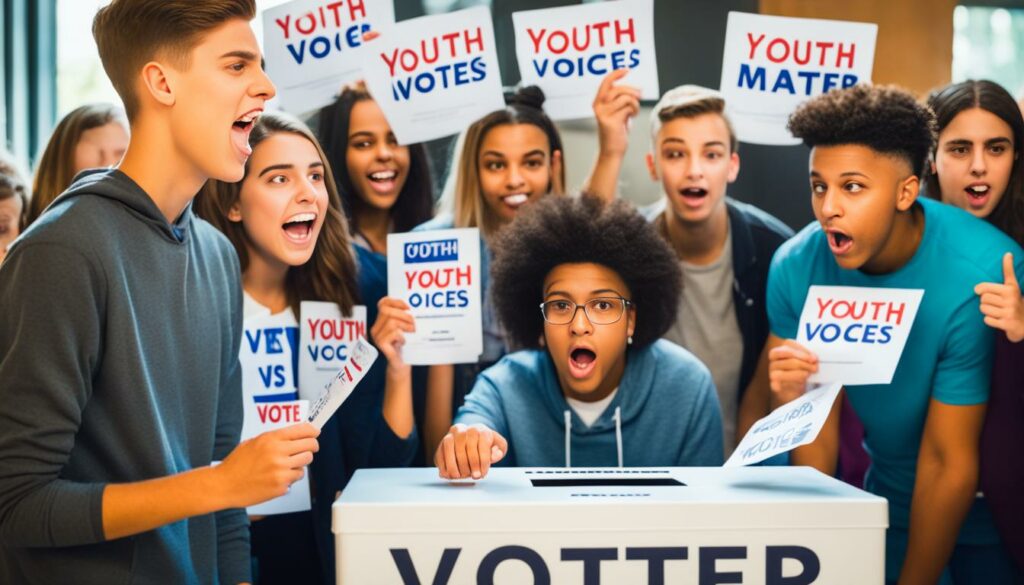
The impact of lowering the voting age on overall voter turnout is a subject of debate. Some studies suggest that allowing 16 and 17-year-olds to vote can lead to increased voter turnout among older age groups. Research from Tufts University indicates that when young people engage in politics and encourage discussions within their families, it can translate into higher voter participation across all age demographics. This suggests that involving teens in the democratic process can have a positive ripple effect on overall voter engagement.
Engaging young people in political discussions and encouraging their participation in the electoral process can help create a culture of active civic engagement. When teens are given the opportunity to vote, it not only empowers them to make their voices heard but also prompts them to discuss political issues with their peers, families, and communities. This increased political awareness and participation can have a cascading effect, inspiring older generations to also become more involved in the democratic process.
“When young people engage in politics and encourage discussions within their families, it can translate into higher voter participation across all age demographics.”
By involving teens in voting, we instill in them a sense of responsibility and active citizenship from an early age, which is crucial for the future of our democracy. Studies have shown that when young people are given the opportunity to vote, they are more likely to develop long-term voting habits, resulting in sustained voter participation throughout their lives.
The inclusion of 16 and 17-year-olds in the voting process can also address the gap in representation. Teens have unique perspectives and concerns that deserve to be heard and taken into account in the political decision-making process. Allowing them to vote enables a more diverse range of voices to shape policy and legislation, making our democracy more representative of the population it serves.
Historical Changes in Voting Rights
The debate around the voting age is not new. Throughout history, voting rights have evolved to be more inclusive, granting suffrage to previously excluded groups. From the adjustments made to include women and racial minorities to the lowering of the voting age to 18 in the 1970s, the concept of who can vote has evolved over time. Lowering the voting age for teens can be seen as a continuation of this trend toward a more inclusive and representative democracy.
“The history of voting rights is a testament to the ongoing struggle for equal representation and the recognition of the power of every citizen’s voice.”
Over the years, societies have recognized the importance of expanding political participation to ensure that all individuals have a say in the decisions that shape their lives and communities. The voting age debate is just another chapter in this long-standing discussion about representation and inclusivity.
The Fight for Suffrage: Inclusion and Progress
Throughout the 19th and 20th centuries, marginalized groups fought tirelessly for their right to vote. Women’s suffrage movements emerged, leading to landmark achievements such as the ratification of the 19th Amendment in the United States in 1920. This enshrined women’s right to vote and paved the way for increased female participation in the democratic process.
Racial minorities also faced systemic barriers to voting. In the United States, the Civil Rights Movement of the 1950s and 1960s challenged segregation and voter suppression, resulting in the Voting Rights Act of 1965. This legislation aimed to eliminate discriminatory practices that prevented African Americans from exercising their right to vote.
The Voting Age: From 21 to 18
Prior to the 1970s, the voting age in many countries, including the United States, was 21. However, as societal perspectives on maturity and citizenship evolved, so did the age at which individuals were deemed eligible to vote. The Vietnam War and the draft played a significant role in shaping this change.
Youth activists and anti-war advocates argued that if young adults were old enough to be drafted and fight in the war, they should also have the right to vote on matters that affected their lives. In response to this growing sentiment, the United States lowered the voting age to 18 through the 26th Amendment in 1971.
“The lowering of the voting age to 18 reflected the recognition that young adults should have a say in shaping their nation’s policies, especially those related to war and peace.”
This image captures the essence of the voting age debate, highlighting the tension between different perspectives on youth political participation.
As the debate over whether teens should be allowed to vote continues, it is important to consider the historical context and the progress that has been made in expanding voting rights. Lowering the voting age for teenagers can be seen as a natural progression towards a more inclusive and representative democracy, extending the principles of suffrage and equal representation to the younger generation.
Initiatives and Legislation
The voting age debate has spurred various initiatives and legislative efforts aimed at lowering the voting age in different states and municipalities across the United States. These initiatives serve as tangible examples of ongoing endeavors to expand voting rights and increase youth participation in the political process.
One notable instance is Takoma Park, Maryland, which became the first city in the United States to lower the voting age to 16 for local elections in 2013. This landmark decision was made with the intention of promoting youth engagement and fostering a more inclusive democracy.
Similarly, Brattleboro, Vermont, followed suit and further expanded youth participation by lowering the voting age to 16 for local school board elections. These proactive approaches demonstrate a growing recognition of the importance of young voices in shaping local policy and decision-making processes.
These initiatives not only provide opportunities for young individuals to have a direct say in matters that affect their immediate communities but also serve as catalysts for broader conversations regarding the voting age debate at the national level.
Conclusion
The question of whether or not teens should be allowed to vote is a topic of much debate and deliberation. Supporters believe that granting teens the right to vote can have positive effects on youth political engagement, representation, and education. By involving young people in the democratic process, we can cultivate a sense of civic duty and foster active participation in society.
However, opponents raise valid concerns regarding the maturity and readiness of teens to make important political decisions. They worry that lowering the voting age may dilute the influence of older, more experienced voters and that teens may be easily influenced or lack sufficient knowledge about the political system.
As the debate continues, it is crucial to carefully consider the potential benefits and risks associated with allowing teens to vote. Balancing the desire for youth political inclusion with concerns about maturity and impact on existing voter demographics is a delicate task. Ultimately, finding the right balance is essential in ensuring a vibrant and representative democracy for all.
FAQ
Should teens be allowed to vote?
The debate surrounding whether or not teens should be allowed to vote is a topic of much discussion. Proponents argue that lowering the voting age can encourage youth political engagement and ensure that young voices are heard in the democratic process. On the other hand, critics believe that teens may be too immature or lack the necessary knowledge and experience to make informed decisions. Let’s explore the pros and cons of allowing teens to vote.
What are the benefits of allowing teens to vote?
Supporters of lowering the voting age argue that it can foster youth political engagement and civic participation. They believe that involving young people in the democratic process early on can instill a sense of civic duty and encourage them to be active participants in society. Additionally, proponents of teen voting rights state that if 16-year-olds are allowed to work, pay taxes, and drive, they should also have a say in electing the officials who make decisions that directly impact their lives.
How does lowering the voting age promote diverse perspectives?
Allowing teens to vote can lead to increased representation and a diversity of perspectives in the political landscape. Teens have unique concerns and viewpoints that may differ from those of older voters. Lowering the voting age can ensure that these perspectives are taken into account and that the government is more representative of the entire population.
Can lowering the voting age provide political education?
Lowering the voting age can provide an opportunity for political education and raise awareness among young people. Engaging in the electoral process at a younger age can help teens develop critical thinking skills, become better informed about political issues, and learn to make their own decisions. This early exposure to politics can encourage lifelong civic engagement and active participation in democracy.
What concerns are raised about allowing teens to vote?
Critics of allowing teens to vote have expressed concerns about their maturity and readiness to make important decisions. Some argue that teens may be easily influenced or swayed by peer pressure, leading to uninformed voting choices. Others raise concerns about the lack of life experience and limited knowledge of the political system that teens may have. Additionally, opponents worry that lowering the voting age could dilute the impact of older, more experienced voters.
What can we learn from countries that have lowered the voting age?
Several countries have already implemented lower voting ages, providing valuable insights into the impact of youth voting. For example, Austria allows 16-year-olds to vote in all elections. Studies have shown that while the voter turnout for this age group may be lower, their vote “quality” is similar to that of older voters. This suggests that young voters are capable of making informed choices and voting for candidates whose beliefs align with their own.
Does lowering the voting age impact overall voter turnout?
The impact of lowering the voting age on overall voter turnout is a subject of debate. Some studies suggest that allowing 16 and 17-year-olds to vote can lead to increased voter turnout among older age groups. Research from Tufts University indicates that when young people engage in politics and encourage discussions within their families, it can translate into higher voter participation across all age demographics. This suggests that involving teens in the democratic process can have a positive ripple effect on overall voter engagement.
How has voting rights evolved over time?
The debate around the voting age is not new. Throughout history, voting rights have evolved to be more inclusive, granting suffrage to previously excluded groups. From the adjustments made to include women and racial minorities to the lowering of the voting age to 18 in the 1970s, the concept of who can vote has evolved over time. Lowering the voting age for teens can be seen as a continuation of this trend toward a more inclusive and representative democracy.
What initiatives and legislation are being proposed?
The discussion around lowering the voting age has gained traction in recent years. Various initiatives and proposed legislation have emerged in different states and municipalities across the United States. Some cities, such as Takoma Park, Maryland, and Brattleboro, Vermont, have already lowered the voting age for local elections. These initiatives serve as examples of ongoing efforts to expand voting rights and increase youth participation in the political process.
What is the conclusion on whether teens should be allowed to vote?
The question of whether or not teens should be allowed to vote is complex and multifaceted. Supporters argue that it can promote youth political engagement, diverse representation, and political education. However, opponents express concerns about maturity and the potential dilution of older voters’ influence. As the debate continues, it is crucial to consider the potential benefits and risks associated with lowering the voting age and the impact it may have on our democratic processes.

